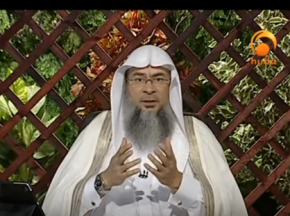content of level
Questions in the Grave
Questions in the Grave, Good deeds turn into a good looking man - Assim al hakeem.
Is it compulsory to have a Sutra in front of you while praying alone?
Is it compulsory to have a Sutra in front of you while praying alone? - Assim al hakeem.
Does a Man have to obey his parents in their choice of woman when getting married?
Does a Man have to obey his parents in their choice of woman when getting married? - Assim al hakeem
When is the last time to pray Maghrib?
When is the last time to pray Maghrib?
Microblading Eyebrows
Microblading Eyebrows
Is Converting To Marry Someone You Love Allowed?
It is possible for someone to love a Muslim and get to know about Islam because of this person and then accept Islam. People arrive to Islam through many different channels and love can be one of them.
Is It Permissible To Remove Hair From Eyebrows?
Is It Permissible To Remove Hair From Eyebrows?
Shall I Pray Witr With Imam Or At Home After My Tahajjud?
Shall I Pray Witr With Imam Or At Home After My Tahajjud?
My Imam Prays Witr Like Maghrib, Is This Allowed?
My Imam Prays Witr Like Maghrib, Is This Allowed?
Is A Traveller Allowed To Shorten His Prayer Only on Road?
Is A Traveller Allowed To Shorten His Prayer Only on Road?
Should Women Praying At Home Call Iqamah Before Salaah?
Should Women Praying At Home Call Iqamah Before Salaah?
Can We Join Prayers When We Are At The Airport Before Departing?
Can We Join Prayers When We Are At The Airport Before Departing?
HOW COMPANIONS USE TO DEAL WITH BID'A?
HOW COMPANIONS USE TO DEAL WITH BID'A.
Taking the dead body to his hometown for burial
Taking the dead body to his hometown for burial
After purity from menses, should I pray the prayer that is due or one before it as well ?
After purity from menses, should I pray the prayer that is due or one before it as well ?
Can we write notes in the Quran (Mushaf)?
Can we write notes in the Quran (Mushaf)?
Is not wearing the hijab a Major sin?
Is not wearing the hijab a Major sin? Punishment for women who display themselves - Assim al hakeem.
Must we close our Doors, Windows, Curtains, Cover Pots & Water containers at Maghrib?
Must we close our Doors, Windows, Curtains, Cover Pots & Water containers at Maghrib? Assim al hakeem
Is it disrespectful to point your feet towards the Quran?
Is it disrespectful to point your feet towards the Quran?




















